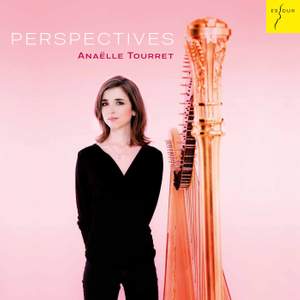When the freshly pressed CDs turned up at her home, Anaelle Tourret was on tour with the NDR Elbphilharmonie Orchestra, where she has been principal harpist since 2018. She won her position there at just 25 years of age, having set her sights on the job ever since winning the 19th International Harp Contest in Israel in 2015. In October/November 2021, in concert halls in Madrid, San Sebastian, Friedrichshafen and Cologne now that tours are possible once again at last she played Max Bruch's Scottish Fantasy, op. 46, for orchestra, violin and harp. Next to her on the stage was the violinist Joshua Bell, who expressed his great enthusiasm about their musical partnership to German broadcaster NDR: "I really think that she is one of the best harp players I've ever heard in my life. She is very, very special."
On her debut album, this young French harpist would like to present her instrument to listeners as an "unique example of compositional innovation and transition", far from any excessive romanticism or lavish harmonies. After all, the harp is one of the oldest instruments known to music history and has passed through many different eras and stylistic epochs over the centuries. In the 20th century, it was often deprecated as a kind of angelic salon instrument. But especially the past 100 years have been not just an extremely interesting time for music, but for the harp in particular, writes Tourret in the accompanying booklet. Composers rediscovered the instrument for themselves and came up with innovative techniques and unusual tone colours. Among them were Caplet, Hindemith, Britten and Holliger. The four compositions that Tourret has chosen for the album all posed their own new challenges perspectives and thus represent valuable additions to the repertoire. Those challenges include the unprecedented rhythmically articulated pedal glissandi in Caplet's divertissements pour harpe, the changes of tone colour in Hindemith's Sonata for Harp or the juggling with styles in Britten's Suite for Harp, op. 83.
In presenting these works, Tourret has one main aim: to open up these new perspectives not just for herself but for listeners as well and to show how powerful the harp can be. But this recording is not the first time that the harpist, a former member of the Orchesterakademie of the WDR Symphony Orchestra in Cologne, has engaged with contemporary music. She has already commissioned 20 new works for her instrument to help change the way the harp is perceived and redefine its role: "We are very lucky that composers today are unbelievably interested in the harp." They include Heinz Holliger, with whom she worked together in person for the recording of "Praludium, Arioso und Passacaglia". "It was an honour for me to be able to play it to him. It is an incredibly rich piece with so many new techniques and colours, and with so many emotions. It is especially close to my heart; I couldn't imagine this recording any more without this work."
Anaelle Tourret was born in Orleans, France, in 1992. She studied harp with Ghislaine Petit-Volta, Nicolas Tulliez, Andreas Mildner and Xavier de Maistre. Alongside her orchestral and solo work, Anaelle Tourret teaches at the Hochschule fur Musik und Theater Hamburg as Xavier de Maistre's assistant. In 2020, she was invited to play at the Hollywood Bowl in Los Angeles with the Ensemble intercontemporain, founded by the late Pierre Boulez.






